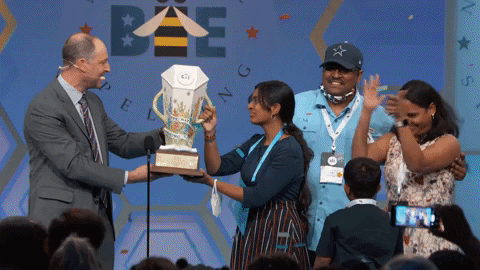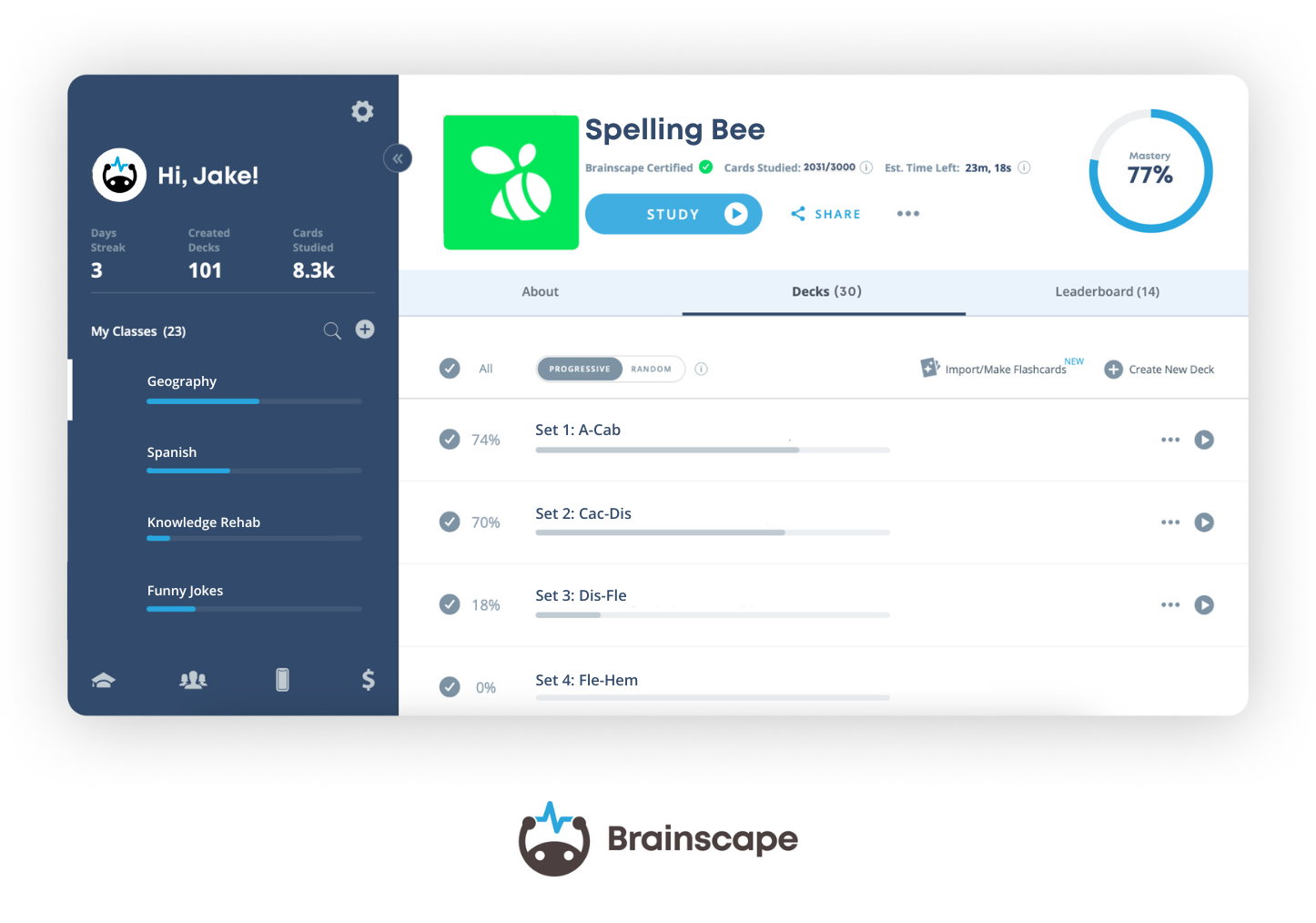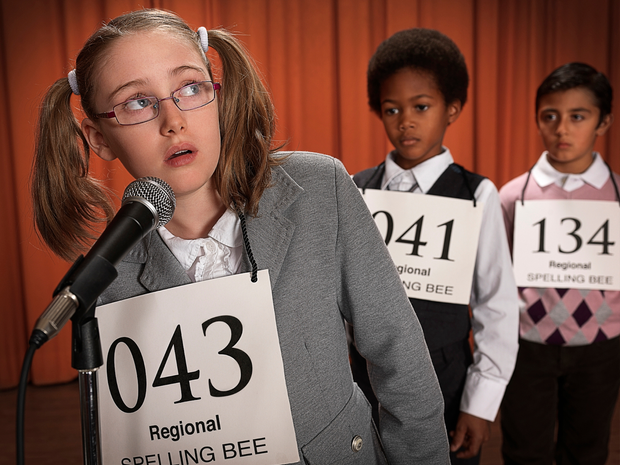If you’re competing in the Scripps National Spelling Bee, congratulations—you’ve just entered the Olympics of letters! This isn’t just any Spelling Bee contest where you memorize a few hundred words. Nope. The Scripps Bee demands mastery of thousands of National Spelling Bee words.
In other words, this is a full-on gladiator battle of spelling skills. The dictionary is your arena, and only the most prepared Spelling Bee champions make it to the final stage.
But before you even step onto that national stage, you’ll battle through school, district, and regional bees. Think of it like a video game: each level gets harder, the Spelling Bee questions get trickier, and only the most prepared make it to face the final boss—the championship round broadcast live to the world.
The good news? With the right Spelling Bee study guide and tools like Brainscape, a smart flashcard study app, you'll be ready to dominate any Spelling Bee competition. Whether it's your school bee or the national finals, you’ll be armed with the knowledge and confidence to spell even the trickiest words correctly.
Spelling Bee Study Guide Strategies for Memorizing Words

Strategy # 1: Study Flashcards that Cover the Scripps National’s Latest Word Lists
One of the best ways to prep for Spelling Bee competitions? Flashcards.
But not the paper kind—we’re talking about smart, digital Spelling Bee flashcards you can study anytime, anywhere, on any device; even offline for studying when you don't have wi-fi. And one of the best flashcard apps is Brainscape.
Why? Because it's already broken down all 3,000 of the Scripps National's latest word lists into a complete set of already-made flashcards, which you can start studying right away
Brainscape’s Spelling Bee flashcards cover the latest word lists and include:
- The word’s correct spelling.
- Pronunciation by a native speaker to help with phonetics.
- Definition, origin, and usage examples.
- A built-in spaced repetition system proven to help you learn twice as fast.
These aren’t just random word lists. They’re structured, science-backed, and designed to help you efficiently work through hundreds of words without feeling overwhelmed.
Strategy # 2: Break it Down With Word Origins (Etymology)
Many Spelling Bee champions swear by etymology as their secret weapon. Knowing where a word comes from helps you predict its spelling based on patterns rather than rote memorization.
Take the word fluorescence. If you hear it's from Latin, that tells you it may include unexpected vowels or suffixes like -esce or -scence. This insider knowledge can spell the difference between elimination and victory.
Champion Insight: 2023 winner Dev Shah said understanding roots and language patterns saved him from small, devastating mistakes. The best Spelling Bee study guides go beyond memorizing words—they help you understand how to spell.
For example:
- Greek words: Often contain ph for an "f" sound (philosophy, phenomenon).
- German words: Tend to have harder consonants and compound structures (kindergarten, schadenfreude).
- French words: Frequently end in -ette or -que (baguette, boutique).
But how do you actually do this? Imagine you’re up on stage at the Scripps National Spelling Bee. The announcer leans into the mic and says:
“Your word is… FLUORESCENCE.”
Your brain instantly goes into panic mode. “Wait… what? Is that even English? Fluor–fluoro–WHAT?”
But then, you remember your secret hack: word origins. You execute your cunning plan:
1. Ask for the word’s origin. You hear that it comes from Latin. That’s great news—Latin words tend to have specific patterns! Many Latin words, especially scientific ones, keep their original spellings even in English.
2. Look for familiar roots. The first part—fluor-—reminds you of “fluoride” and “fluorescent lights.” You figure it must have something to do with light or glowing.
3. Watch out for sneaky vowels. Latin words LOVE throwing in extra vowels where you least expect them. So instead of spelling it florsense (which sounds close but is totally wrong), you remember that Latin often includes the tricky -sc- or -esce ending in words that describe processes (effervescence, incandescence).
4. Double-check the pronunciation trap. The word sounds like "floor-essence," but your knowledge of Latin tells you that the correct structure must be fluorescence. The “u” isn’t obvious when spoken, but it's there if you know the origin!
It’s your turn to lean into the mic with a steady smile:
"F-L-U-O-R-E-S-C-E-N-C-E. Fluorescence."
DING DING DING! You got it! The crowd cheers. Your crush faints from admiration. You advance to the next round.
Spelling Bee Champion Insight: Dev Shah, the 2023 Scripps winner, said that knowing common roots and phonetic patterns saved him from making small, fatal errors. When you know the history of a word, spelling it correctly becomes second nature!

Strategy # 3: Use Phonetics to Master Spelling
Ever noticed how Spelling Bee contestants repeat a word multiple times before spelling it? That’s because hearing the word helps them to process its phonetics.
Some key phonetic strategies:
- Break words into syllables to make them easier to manage.
- Learn common phonetic rules e.g., "i before e except after c" is usually true, but not always. Sometimes, your weird foreign neighbor seizes protein.
- Practice pronouncing words aloud—Brainscape’s Spelling Bee flashcards come with audio, making this much easier.
By understanding phonetics, students decode words by breaking them into sounds. Phonetics sharpen your prediction skills by recognizing tricky sounds. Plus, the sound patterns themselves aid memory. Spell one word right, and it's easier to remember others in the same family!
Strategy # 4: Study a Little Bit Every Day (with Spelling Bee Flashcards)

How can you use flashcards—like Brainscape's—to practice more effectively?
- Daily drills: Spend at least 15 minutes a day reviewing flashcards. Brainscape’s flashcards are synced across mobile and web, so you keep your progress when switching between your computer and your phone. Plus, they allow you to study on the go, so you can sneak in a 60-second study session on the bus or in line for class.
- Personalize tricky words: Bookmark the words you struggle with to come back and review them more frequently.
- Mix it up: Test yourself by writing words down, saying them out loud, and spelling them verbally.
- Work through spelling word lists by difficulty level: our flashcards target groups of words that get increasingly challenging, allowing you to work your way up or immediately get started at your current level of mastery.
Brainscape’s Spelling Bee flashcards are designed to help reinforce difficult words until they become second nature. With spaced repetition, you’ll never forget a word you’ve already mastered.
Strategy # 5: Recreate Competition-Like Conditions When Practicing
Alright, spelling champion-in-training, it’s time to level up. Studying words on your own is great, but if you want to truly dominate on competition day, you need to train like a pro. That means creating your very own high-stakes, high-pressure, adrenaline-pumping Spelling Bee simulation at home.
Here’s how to make it feel like the real deal:
Beyond flashcards, you need real-world Spelling Bee competition experience to prepare for the pressure of the big day. Here’s how to simulate a Spelling Bee at home:
- Recruit Your “Judges” – Get a parent, sibling, or best friend to call out words. Bonus points if they dress up in a suit and give you intimidating, official-sounding sentences: “The word is… flibbertigibbet. He was called a flibbertigibbet after talking nonstop for six hours about etymology.”
- Use a Timer – The Scripps Spelling Bee gives contestants a time limit, so set one for yourself! Practice spelling words under pressure to get used to the ticking clock. (For extra drama, cue up the Jeopardy! theme music in the background.)
- Own the Stage – Stand up, take a deep breath, and spell out loud, clearly, and confidently. Bonus points if you clutch a pretend microphone and dramatically ask, “Can I have the definition, please?”
- Record Your Spelling Showdown – Watching yourself spell might feel weird at first, but it’s a game-changer. You’ll catch mispronunciations, shaky nerves, or that weird habit you have of forgetting to blink when thinking.
Practicing under competition-like conditions reduces nerves and builds confidence—so you’re ready to shine on stage!

Spelling Bee Study Guide: Final Thoughts
If you want to win at any level—school, regional, or national—you need a comprehensive Spelling Bee study guide that helps you:
- Master the full Scripps Spelling Bee study guide word list.
- Use flashcards to reinforce spelling, pronunciation, and definitions.
- Learn etymology to decode unfamiliar words.
- Simulate real-world conditions to build confidence.
At the end of the day, true spelling mastery is about understanding words, not just memorizing them. Treat the Spelling Bee like a puzzle to solve. And with the right tools, like Brainscape’s spelling app and study system, you’ll be well on your way to becoming a Spelling Bee champion.
Good luck, future champ!
